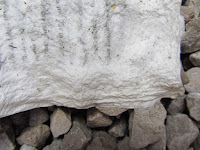I know that people say only your supervisors and examiners ever read your doctoral thesis, but, just in case it's of interest, here's a link to mine, freely available to read thanks to open access publishing and my funding from the Engineering and Physical Sciences Research Council:
Making wonder tales: an exploration of material writing practice for ecological storymaking
http://www.research.lancs.ac.uk/portal/en/publications/making-wonder-tales(ae3caa21-321f-4b4b-9b07-5557033e8170).html
The official academic-speak abstract is below, but in short, it's about ecological stories and how we go about making and sharing them. The focus is on material writing practice, on writing with rather than for technologies, and most of all on engaging directly with ecological subjects and taking inspiration from them into the development of a story's imaginative, narrative and physical forms (for example I made stories inspired by lichens that respond to light and air quality and a flood story that responds to the tides). It's also a call to writers to consider becoming more than content-makers for mainstream corporate publishers, and to come out from behind their desks to try to find new ways to make and share the stories we need in the face of overwhelming environmental crises.
I owe the hugest of thanks to my supervisors, Professor Stuart Walker (Design) and Professor Gordon Blair (Computing) at Lancaster University, and also to my examiners Dr Matt Hayle (University of Birmingham) and Professor Rachel Cooper (Lancaster University), as well as to my wonderful family and friends for their unrelenting support.
Making wonder tales: an exploration of material writing practice for ecological storymaking
Claire Dean (2018)
Abstract
We are confronted by multiple ecological crises worldwide and there is growing evidence that fact-based communication is not helping people to engage with environmental issues. Traditionally, stories have connected people with wider nature, and there have been appeals from conservationists, scientists and theorists for new stories to be shared. To date, however, very little consideration has been given to the ways these new stories may be shaped through contemporary writing practices. Digital technologies provide writers with new opportunities for practice and for reflection on their role in making and sharing stories. This research inquiry uses practice as research to uncover links between material writing practice – an approach where all materials, including the digital, become part of the composition process – and ecological stories. The research is framed by three initial questions:
1) How can writing practices be developed with new technologies for ecological storymaking?
2)How are stories changed when new writing practices are developed for ecological storymaking?
3) What does the development of these writing practices mean for the role and continuing relevance of the writer?
Through substantial reflexive practice, over the course of three projects, the inquiry revealed interrelationships between a story’s subject, content, form and medium, which are often overlooked by mainstream contemporary publishing. By avoiding technological determinism and reducing hierarchies of materials, an approach to material writing practice was developed that uses a range of methods to uncover new possibilities for making and sharing stories. The process-centred approach was shared with other practitioners through workshops and their responses highlighted the benefits of material experiment for practitioners in expanding creative practice and connecting with wider nature. Participant responses, along with my own discoveries through process, demonstrate that creating opportunities for ecological storymaking is a valuable action for change. Through a series of propositions for writers, this research answers the call for new stories with the contribution not just of new stories, but a new approach to storymaking.







